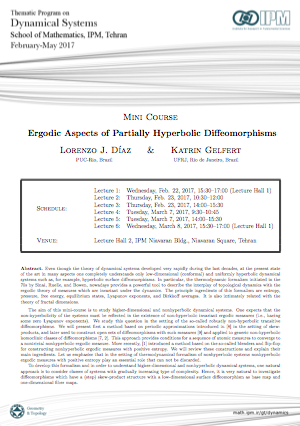Description:
|
Even though the theory of
dynamical systems developed very rapidly during
the last decades, at the present state of the
art in many aspects one completely understands
only low-dimensional (conformal) and uniformly
hyperbolic dynamical systems such as, for
example, hyperbolic surface diffeomorphisms. In
particular, the thermodynamic formalism
initiated in the 70s by Sinai, Ruelle, and
Bowen, nowadays provides a powerful tool to
describe the interplay of topological dynamics
with the ergodic theory of measures which are
invariant under the dynamics. The principle
ingredients of this formalism are entropy,
pressure, free energy, equilibrium states,
Lyapunov exponents, and Birkhoff averages. It is
also intimately related with the theory of
fractal dimensions.
The aim of this mini-course is to study
higher-dimensional and nonhyperbolic dynamical
systems. One expects that the non-hyperbolicity
of the systems must be reflected in the
existence of non-hyperbolic invariant ergodic
measures (i.e., having some zero Lyapunov
exponents). We study this question in the
setting of the so-called robustly non-hyperbolic
transitive diffeomorphisms. We will present
first a method based on periodic approximations
introduced in [GIKN] in the setting of
skew-products, and later used to construct open
sets of diffeomorphisms with such measures [KN]
and applied to generic non-hyperbolic homoclinic
classes of diffeomorphisms [DG],[BDG]. This
approach provides conditions for a sequence of
atomic measures to converge to a nontrivial
nonhyperbolic ergodic measure. More recently,
[BBD] introduced a method based on the so-called
blenders and flip-flop for constructing
nonhyperbolic ergodic measures with positive
entropy. We will review these constructions and
explain their main ingredients. Let us emphasise
that in the setting of thermodynamical formalism
of nonhyperbolic systems nonhyperbolic ergodic
measures with positive entropy play an essential
role that can not be discarded.
To develop this formalism and in order to
understand higher-dimensional and nonhyperbolic
dynamical systems, one natural approach is to
consider classes of systems with gradually
increasing type of complexity. Hence, it is very
natural to investigate diffeomorphisms which
have a (step) skew-product structure with a
low-dimensional surface diffeomorphism as base
map and one-dimensional fiber maps.
Motivated by this, we study a family of
partially hyperbolic diffeomorphisms of step
skew-product type modeled over a horseshoe with
interval or circle fiber maps. These systems are
genuinely nonhyperbolic containing intermingled
horseshoes (and periodic points) of different
hyperbolic behavior (contracting and expanding
center). The associated invariant set possesses
a very rich topological fiber structure, it
contains uncountably many trivial and
uncountably many nontrivial fibers (see [DiGe]).
Starting with a class of very simple
paradigmatic models we study transitive step
skew-products modelled over a shift with
one-dimensional fiber maps. In case the fiber
maps have both contracting and expanding
regions, this dynamics is genuinely
nonhyperbolic and simultaneously exhibits
ergodic measures with positive, negative, and
zero exponents. Moreover, it contains a gap (at
least one) which is associated with (in fact
caused by) an "exposed" ergodic measure,
[DiGeRa1],[DiGe].
We introduce a set of axioms to capture the
essential dynamic features and analyze its
topological dynamics. It turns out that those
axioms equivalently characterize nonhyperbolic
robustly transitive maps. We also study ergodic
and thermodynamic properties by analyzing the
space of ergodic hyperbolic (with either
expanding or contracting fiber exponent) and
nonhyperbolic measures in the weak$^\ast$
topology and in entropy. Our methods include the
explicit construction of hyperbolic sets based
on an approximation using so-called skeletons,
multi-variable-time horseshoes, and our set of
axioms, [DiGeRa2],[DiGeRa3].
|

